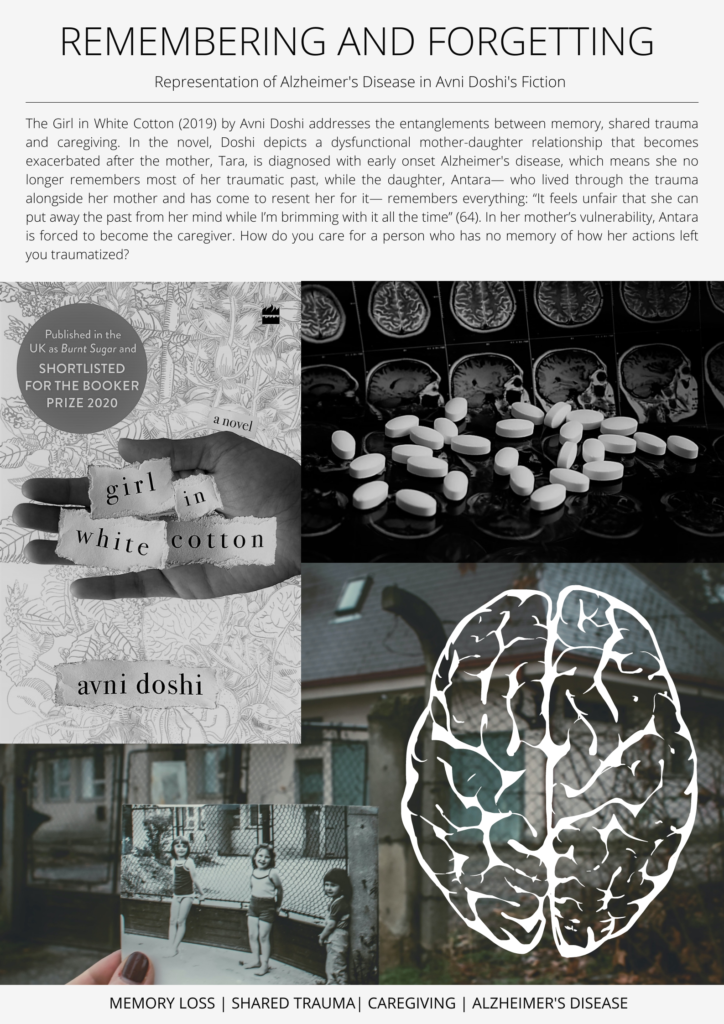
Remembering and forgetting seem to be options that we have. But are they really choices? Do we choose to remember certain things and forget the others?
The Girl in White Cotton is a debut novel by Avni Doshi, published in 2019 that explores the entanglements between memory, shared trauma and caregiving. The plot follows the fraught relationship between a mother and daughter, Tara and Antara. The daughter must care for her mother, as the latter is suffering from memory loss caused by the early onset of Alzheimer’s disease. However, the caregiving endeavour is excruciating for the daughter owing to their shared traumatic past. This is evident in the opening confession of Antara’s narrative voice that sharply draws attention to a raw, intimate space and experience of animosity between the mother-daughter duo whose bond is unmistakably hostile, marked not only by neglect but also by active cruelty; Antara’s self is the site of trauma, stricken with grief, rage, and uncertainty, all of which are exacerbated by Tthe chaos that is Tara’s deteriorating memory, as she refutes Antara’s claims about their shared past;
“I would be lying if I said my mother’s misery has never given me pleasure. I suffered at her hands as a child, and any pain she subsequently endured appeared to me to be a kind of redemption— a rebalancing of the universe, where the rational order of cause and effect aligned. […] My mother is forgetting, and there is nothing I can do about it. There is no way to make her remember the things she has done in the past, no way to baste her in guilt. I used to bring up instances of her cruelty, casually, over tea, and watch her face curve into a frown. Now, she mostly can’t recall what I’m talking about; her eyes are distant with perpetual cheer” (1).
Alzheimer’s disease is a brain disorder that can progress slowly or rapidly, and cause the patients to lose their identity, and the ability to carry out the simplest tasks as they experience memory loss, an inability to think, plan, and recognise even those closest to them. Doshi narrates the experience as such; “It must be the worst kind of suffering – cognizance of one’s own collapse, the penance of watching as things slip away”(3). Tara is diagnosed with early-onset Alzheimer’s, which means that the early signs began appearing in her middle age. Doshi explains the process of the changes that happen in the brain, such as amyloid plaques and neurofibrillary, or tau, tangles, that result in the loss of neurons and their connections, with the metaphor of a defunct bank in order to attempt to understand their unexplainable present and uncertain future, by relating disease to everyday experience of past and present knowledge; “The Hippocampus is the memory bank and, in this disease, the vaults are being emptied. Long term memory cannot be formed, short-term memory vanishes into ether. The present becomes a fragile thing which, moments later, seems to have never happened. As the hippocampus gets weaker, space may appear different, distorted” (8).
One of the most important points Doshi makes about the difficulty of caring for someone you despise is the desire and tendency to be cruel;
“When she no longer has a complete consciousness of who she is and who I am, will it be possible for me to care for her the way I do now, or will I be negligent, the way we are with children who are not our own…believing we will get away with it, because decency is something we enact in public, with someone to witness and rate our action, and if there is no fear of blame, what would the point of it be?” (122).
Steven R Sabat, in his study about caregiving of Alzheimer’s patients, has shown that practitioners and family caregivers lack knowledge about the phenomenon of implicit memory (ability to encode and retrieve information without conscious awareness), and appear to believe that a person with Alzheimer’s disease (AD) has no memory of recent events and experiences because their ability to recall details of those events and experiences is impaired (Sabat, S R, 2006). However, after experiencing a distressing situation, the person with AD may begin to cry—for “no apparent reason”—sometime later, possibly in the presence of the person who was involved in the distressing situation. When asked why he or she is crying, the person may say, “I don’t know,” indicating that no explicit, conscious recall of the distressing situation exists (13). He concludes by saying that “people with AD can be strongly affected by how they are treated even though their ability to recall that treatment consciously may be seriously compromised” (14).
Doshi’s fiction can be read as a complex analysis of the nature and process of memory, experiences of shared trauma and caregiving, as well as a testament to the fictional possibilities of memory explorations, and the role of literature in foregrounding the ways in which memories can be written about, discussed and engaged with.
References:
- Alzheimer’s disease – Symptoms and causes. (2022). Retrieved 15 June 2022, from https://www.mayoclinic.org/diseases-conditions/alzheimers-disease/symptoms-causes/syc-20350447#:~:text=Overview,person’s%20ability%20to%20function%20independently.
- Chakrabarti, P. (2022). Avni Doshi talks about exploring memory and the bitter aftertaste of messy relationships. Retrieved 15 June 2022, from https://indianexpress.com/article/lifestyle/books/girl-in-white-cotton-avni-doshi-book-on-relationships-6271366/
- Dawoor, Y. (2022). Burnt Sugar by Avni Doshi. Retrieved 15 June 2022, from https://www.worldliteraturetoday.org/2021/summer/burnt-sugar-avni-doshi#:~:text=Set%20in%20Pune%2C%20India%2C%20it,latter%20is%20diagnosed%20with%20dementia
- Doshi, A. (2019). Girl in white cotton: A novel. Fourth Estate
- Hunt, E. (2022). Booker nominee Avni Doshi: ‘Women feared my ambivalence towards motherhood’. Retrieved 15 June 2022, from https://www.theguardian.com/books/2020/jul/28/avni-doshi-women-feared-my-ambivalence-towards-motherhood-booker-prize-interview-burnt-sugar
- Sabat S. R. (2006). Implicit memory and people with Alzheimer’s disease: implications for caregiving. American Journal of Alzheimer’s disease and other dementias, 21(1), 11–14. https://doi.org/10.1177/15333175060210011
- What Happens to the Brain in Alzheimer’s Disease?. (2022). Retrieved 15 June 2022, from https://www.nia.nih.gov/health/what-happens-brain-alzheimers-disease

Pingback: Collective Memory - Angel Maria Varghese